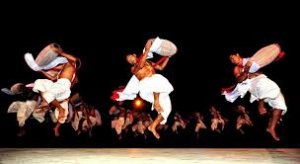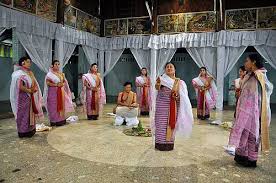Manipur, a state rich in culture and tradition situated in northeastern India, fenced by Nagaland in the north, Mizoram in the south, Assam in the west and Burma in the east. The state of Manipur gave rise to a mesmerizing dance form known as Sankirtana. The term ‘san’ comes from the word ‘sanyak’ which means to ‘complete’ and ‘kirtana’ comes from the Sanskrit root ‘kirtan’, which means ‘praising’, ‘glorifying’ or ‘celebrating’.
Sankirtana is a form of performing art. In a typical performance, two drummers and about ten singers and dancers perform. They perform in such a way as if they are saying “to watch us dance is to hear our hearts speak”. This dance originated back in the 15th century by Manipuri Hindus as a form of worship initiated in the palace of queens and princess. It reached many more places until the 18th century but primarily practiced by the Vaishnava community.
Although there are many sub-forms of sankirtana dance, every performance must start with a particular set of rules such as lightning the incense sticks, applying sandal paste and many more. Its commencement takes place with the chanting of Raag followed by Guruchandrika. The further performance involves ritual singing, drumming and dancing. Singing involved in sankirtana dance is a major form of Indian Classical Singing. They use almost 100 talas and music variations. It also involves high pitch singing by women. Drums and cymbals are the main musical instruments used by artists. It is always performed in a mandala inside a mandap. The rituals and formalities are extremely strict. The audiences cannot enter or leave the performance midway.
Sankirtana is considered as a visible manifestation of God. This dance form mainly depicts stories of Krishna. They jubilate the union of Krishna and Radha in their performance and depicts their separation as well. The dignity and the flow of aesthetic and religious energy are extremely adrenalizing. It as acts as a cohesive force and establishes a cordial relationship between the individuals as these festive occasion brings cents of people under one roof.
The Sankirtana dance form is also inscribed on the representative list of UNESCO Intangible Cultural Heritage of Humanity in 2013 making India a proud nation regarding its culture and art forms. Ministry of Culture under Government of India runs an autonomous body Sangeet Natak Akademi, a national academy of music, dance and drama offering professional courses in Sankirtana dance form. This academy has produced many award-winning artists such as Yumlemban Gambhini Devi, Sougaijam Thanil Singh both honored with Padma Shri Awards.

Such vibrant dance forms of India adds to the cultural wealth of our nation. The colors of such vibrant dance forms must be spread among our young generation to maintain the legacy of such beautiful art forms and not let them become a part of history only but a part of future as well.





